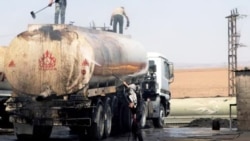On October 13, the Syrian Minister of Economy and Trade, Mohammed Samer al-Khalil, spoke at a news conference about reconstruction and development in Syria after a decade of civil war.
Al-Khalil said losses in the Syrian oil sector through 2020 reached $95 billion. He put losses in the electricity sector at $100 billion. Oil and electricity were the two sectors most targeted by destruction and looting during the fighting, he said.
“’Til today, oil fields continue to be looted under U.S. supervision and by U.S. companies in northeastern Syria and with the cooperation of terrorist groups in the area,” al-Khalil said.
That is false.
To be sure, former President Donald Trump’s repeated boasts that he “kept the oil” in Syria have helped confuse matters. But his replacement, Joe Biden, killed a waiver that had allowed a U.S. oil contractor to operate in Syria. The few U.S. troops there now are only to fight the remaining jihadists in the area.
First some background.
The largest oil fields in Syria are in the east, close to the Iraqi borders and mostly in areas under the control of the Kurdish-led autonomous authorities. Syria’s oil production averaged more than 400,000 barrels per day between 2008 and 2010, but after the 2011 uprising began, the oil sector has been in a state of disarray, according to the U.S. Energy Information Administration.
Syria is not a major oil producer compared to neighbors like Iraq and Saudi Arabia. Still, oil did help prop up the government of President Bashar al-Assad before the civil war.
In 2014, while the Assad forces were fighting rebel forces closing on Damascus, the jihadi group Islamic State (IS) took swaths of oil country in north, east and central Syria. During its peak IS captured the Syrian city of Raqqa as the capital of its self-declared caliphate.
The Kurds in this part of Syria began blocking IS attacks on their towns and villages. They allied with the United States in fighting against IS, and in 2015 the Kurdish fighters spearheaded the Syrian Democratic Forces (SDF) in the fight against IS.
The IS group had reportedly installed hundreds of makeshift oil refineries to generate profit in areas under its control in northeast Syria and in Iraq. Daniel Glaser, a former senior U.S. Treasury official, said that IS once generated some $500 million a year off oil sales.
By 2019, the SDF and U.S.-led coalition defeated IS. However, the terror group continues to launch attacks in eastern Syria, and the SDF continues to hunt down IS sleeper cells.
Following the IS defeat, then-president Trump announced a troop pullout from Syria. But he also repeatedly said, using various turns of phrase, that the U.S. would “keep the oil.” In October 2019, ABC News reported:
“We're keeping the oil,” Trump said Monday to a conference of police chiefs in Chicago. “I've always said that – keep the oil. We want to keep the oil, $45 million a month. Keep the oil. We've secured the oil.”
In 2020, a U.S. firm called Delta Crescent Energy LLC secured a deal with the Kurdish authorities under an authorization from the U.S. government. The firm’s partners include former U.S. ambassador to Denmark James Cain, also a Republican campaign donor; James Reese, a former U.S. special forces officer; and an experience oil executive, John Dorrier Jr.
The Daily Beast reported that Delta was to earn $1 per barrel of oil exported from Syria, according to government filings. Dorrier, the firm’s CEO, had worked with a U.K. oil company with offices in Syria. He told the Military Times that Delta “had some $2 billion in contracts to sell oil into the international market that will benefit American allies in northeast Syria that have helped in the fight against the Islamic State group.”
The Assad foreign ministry called it all a U.S. plot to “steal Syria’s crude oil.” The ministry described the Kurdish forces as “terrorist militias,” and predicted they would be defeated by the government.
Delta Crescent Energy was the only firm licensed by the U.S. government to work in Syria. The license was permitted despite U.S. Treasury sanctions aimed at punishing the Assad regime.
Things changed when the new Biden administration did not renew Delta’s sanctions waiver this year.
In February, Pentagon spokesman John Kirby said that the 900 American troops then in Syria were there to resist IS and “are not authorized to provide assistance to any other private company, including its employees or agents, seeking to develop oil resources in Syria.”
According to the Syrian Observatory for Human Rights (SOHR), a U.K.-based Syria war monitor, more than 606,000 people have been killed in Syria since the outbreak of conflict in 2011, and 13 million people have been displaced, mostly by Assad’s government.







